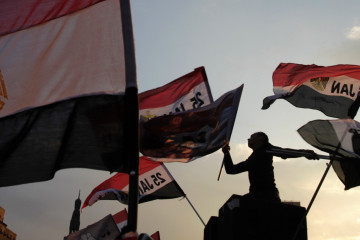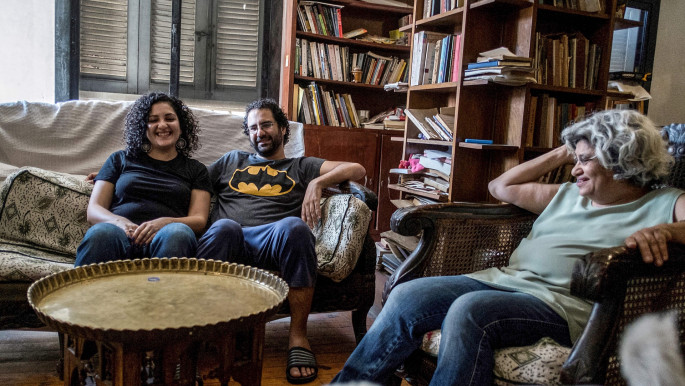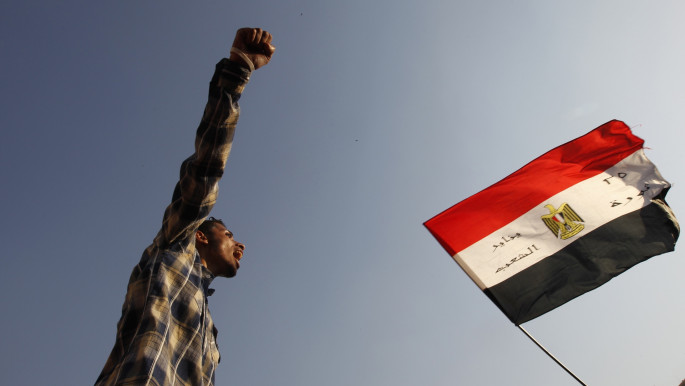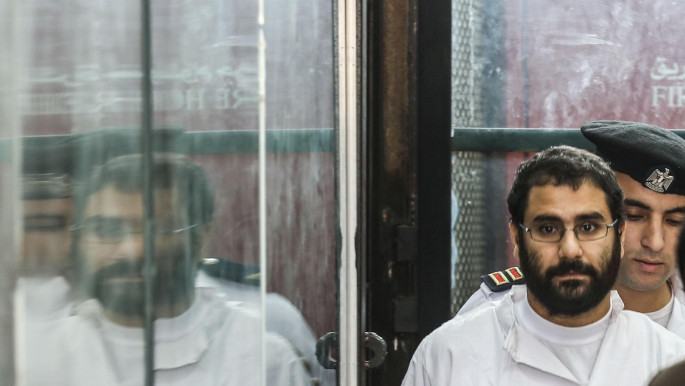

The Seif family, ordinary Egyptians, have confronted oppressive regimes over the decades with extraordinary strength, challenging a security apparatus which has made them pay dearly – sometimes with years behind bars.
The family of Seif, his wife, mathematics professor Laila Soueif, his daughters Sanaa, 27, Mona, 34, and his son Alaa, 39, were among the most prominent voices before, during and after the January 25 uprising. Their legacy of resistance, passed on by their father and maintained by their mother, has inspired a whole generation.
Dubbed by activists and revolutionaries as "the mother of prisoners," Soueif has maintained the legacy of her late husband, becoming a rights activist herself at the age of 16, even before joining college, then later an advocate for the right of academic independence through the September 9 movement.
Soueif, 64, has remained fearless over the years, despite the crackdown against dissidents during the eras of late president Anwar Sadat, late ousted president Hosni Mubarak and the current regime of President Abdel-Fattah el-Sisi.
Her son, known by the name Alaa Abdel Fattah, a blogger and one of Egypt's most renowned political activists, has been repeatedly arrested and tortured and is now being held in pre-trial detention at a maximum-security prison.
 |
The uprising attempted to allow people to decide their own destiny. But we lost to a violent system supported by a military institution ready to destroy anyone |  |
Like father, like son
Even before the uprising erupted, Alaa Abdel Fattah fought for the rights of his generation. He was among the leading voices during the January 25 revolution that toppled Egypt's long-time autocracy under Mubarak. Later, he defied the interim rule of the Supreme Council of the Armed Forces (SCAF) that took over the country and was detained in the process.
As the years went on, Abdel Fattah fought for the rights of those who lost their lives during the massacres committed against supporters of the first democratically-elected president Mohamed Morsi 2013. "Sisi is a war criminal…regardless of the fact that those killed were my political enemies," Alaa once said during a protest.
After he was released more than a year ago after serving five years in prison for organising an illegal protest, he was described by the Egyptian Front for Human Rights as being "half-free, half-prisoner" for being obliged to spend 12 hours every night at the police station as part of the precautionary measures of his parole. He was later detained as he was leaving the police station over ambiguous charges and kept in pre-trial detention.
 |
|
| Alaa Abdel Fattah, Laila Soueif (R) and Mona Seif pictured in Cairo in 2019. [Getty] |
Mona Seif joined forces with her mother, attempting to free Alaa and her sister Sanaa, who was detained last year after allegedly being framed by the authorities as she called for her brother's right to fair treatment in jail.
For Mona and Laila, the bitter fact is that the Egyptian uprising's failures have far outweighed any of its successes.
"It is illogical that there are thousands behind bars, a regime that broke a record in enforced disappearances, torture and other human rights violations, for me to assume that the uprising succeeded," Mona, also a biologist and a founding member of No Military Trials for Civilians group, told The New Arab.
"It's clear we are undergoing a state of defeat. This doesn't mean that the uprising did not make a difference. But we have definitely been paying dearly for both our defeat and the obsessions of a mad authoritarian rulership," she added.
Soueif agrees with her daughter to some extent. "The uprising has definitely failed. The problem is with the definition of failure. For a revolution to succeed, it should rule and achieve its goals. The masses that took to the streets turned the situation into an uprising that aimed to topple Mubarak. Had Mubarak fired the then-interior minister Habib El-Adly [over killing peaceful protesters], things would have been different," Soueif recalled.
According to Soueif, the main purpose of the uprising was to overthrow Mubarak and reform the interior ministry. "But only one target was achieved. This in itself was a partial success; but it was later suppressed by several factions," she argued. Soueif believes that the Muslim Brotherhood's victory in 2012 presidential elections, Egypt's first free vote, was because "it was the only organised group."
 |
It's clear we are undergoing a state of defeat. This doesn't mean that the uprising did not make a difference |  |
"Authority is based on organisation. At the beginning, the different political forces had no clear vision about a revolution. What they had in mind was that they pressured the regime for reform," Soueif explained. "Over history, it was quite rare for a reformist to become a revolutionary."
Unlike many secular groups, Mona rejects the common perception that the Brotherhood hijacked the revolution. "The uprising overshot all groups, organisations and factions. I can't grasp a fight over the possession of something that was far bigger than all of us," she reflected. For Seif, the Brotherhood's mistake was that "they did not adopt a revolutionary agenda or bet on the power of the people."
"At every stage, there was a party that made mistakes until June 13, 2013 [when the army led by Sisi overthrew Morsi]," Laila Soueif said. "All revolutions entail mistakes; what differentiates them is the power struggle. In this respect, only the Brotherhood and the National Salvation Front [composed of 35 secular political groups] appeared on the scene; and both couldn't run it".
 |
|
| Read more: Ten years on, did Egypt's January 25 revolution fail? |
Mona Seif disagrees with the narrative adopted by many Egyptians that due to deteriorating conditions under Sisi's reign people were better off before the uprising broke out.
"Personally, I don't think [we] were better off during Mubarak's regime. If we could turn back the clock, I wouldn't wish to go to how things were before 2011. Our perception of our homeland became different after the uprising than the total dissociation we had before 2011. What we are currently experiencing is based on the infamous legacy of the pre-uprising era," Seif argued.
"The uprising did not bring about someone from Mars. Sisi originated from Mubarak's regime and the military institution. The uprising attempted to allow people to decide their own destiny. But we lost to a violent system supported by a military institution ready to destroy anyone," she added.
 |
I cannot imagine the future in this country under this regime, where prison has become part of our daily life |  |
Future unclear
Soueif has mixed feelings about the future of Egypt and Egyptians under Sisi's regime. "It is very difficult to predict where Egypt is heading for. The only thing I'm sure of is that it's not heading for stability," Soueif said.
"But with the [current] lack of stability, there is always an opportunity for people to gain their freedom. What I'm not sure about is whether we will be able to seize them or whether we learned from the mistakes of 2011. Who knows?" she added. "I don't believe it's the anti-protest law that discourages people from revolting. But in a nutshell, you can't foresee people's reactions towards the nail in the coffin."
 |
|
| Alaa Abdel Fattah's trial at the Shura Council in 2014. [Getty] |
Seif does not have the optimism of her mother, though. "For me, Egypt in 2021 is quite miserable. I have always had no vision of life outside Egypt. For someone whose line of work is scientific research, I always thought I would study abroad; but my visions were always linked to Egypt. Throughout the past two years, these perceptions changed inside me," Seif said sadly.
"Many of those who stopped any kind of political activism were detained or imprisoned for no reason. We are being punished for previous stances. At the same time, this regime doesn't allow a space for change or for people to create a life. Activists were defeated and became idle politically for years, why punish them over nothing?" she wondered.
"It's a kind of sad epiphany. I cannot imagine the future in this country under this regime, where prison has become part of our daily life," Seif concluded.
Horriya Marzouk is a pseudonym. The author resides in a jurisdiction where the publication of their identity may create a security or freedom of movement issue
Join the conversation: @The_NewArab




 Follow the Middle East's top stories in English at The New Arab on Google News
Follow the Middle East's top stories in English at The New Arab on Google News


